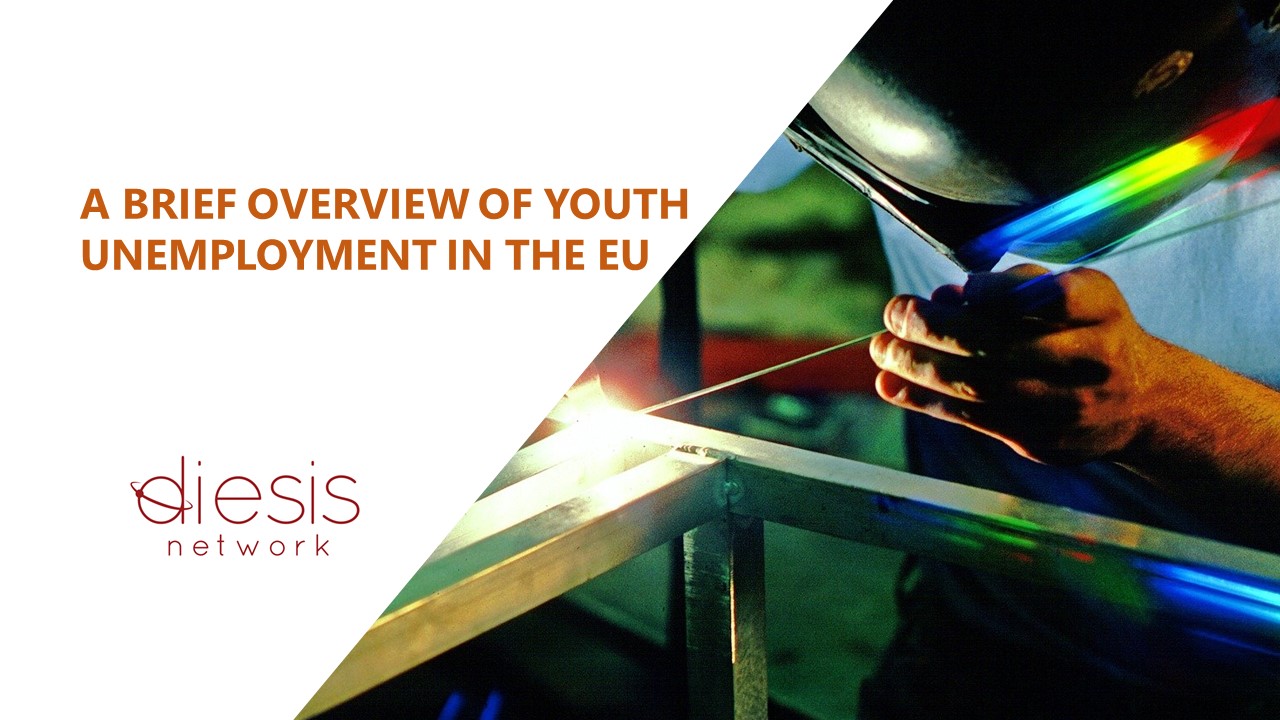Alessia Sebillo, Executive Director of Diesis Network – Education & Training, Anti-discrimination and SDGs
Youth unemployment remains on an upwards trajectory across Europe. Young people find it very difficult to get a decent and stable job, despite being one of the best-educated generations ever. They are still suffering the effects of the economic crisis and youth unemployment remains stubbornly high in parts of the region years after the peak of the crisis.
While the Eurozone’s overall unemployment rate came in at 7.8 % for February 2019, the youth unemployment (15-24) remains high at 16.1% (14,6% in the EU-28) [1]. Moreover, the COVID-19 pandemic is now posing a new threat: younger generations are facing a harsher labour market than older generations. In August 2020, it stood at 17.6% and is expected to continue rising. The European Commission’s summer 2020 economic forecast predicts that the EU economy will shrink 8.3% in 2020, the deepest recession in the EU’s history. According to the ILO Monitor: COVID-19 and the world of work. 4th edition, youth are being disproportionately affected by the pandemic, and the substantial and rapid increase in youth unemployment seen since February is affecting young women more than young men.
Furthermore, in Europe there is an asymmetry in levels of development of strategies and opportunities for transforming youthful energy into entrepreneurship, new ideas, organisations and a future vision for societies. A large majority of WB youth express anxiety about being without a job. Economic factors and negative perceptions of their home country’s situation appear to be the strongest drivers of youth emigration. Compared to youth from the WB countries, youth from EU member countries are substantially less likely to emigrate, especially when it comes to long-term migration.
However, in a recent report, Partners Albania (member of Diesis Network), together with other organisations from Serbia, North-Macedonia, Montenegro and Turkey, showed a general improvement compared to four years ago in particular for the economic youth participation. Youth labour force participation rate and youth employment rate have been slightly increasing. Young men however, seem to have a better inclusion in the labour market rather than young women.
To offset the impact on young people, the Commission proposed a new initiative called Youth Employment Support in July 2020. The EU is investing tens of billions of euro to power the recovery plan for young people. Member States need to prioritise investments that can help young people in the short and medium term. The proposal actively tackles gender, racial and ethnic stereotypes, while supporting diversity and inclusiveness, including for young people with disabilities. Moreover the Commission’s proposal also helps accelerating the much-needed digital and green transitions, acknowledging both the opportunities and uncertainties that come with them. This is further supported by the European Skills Agenda for sustainable competitiveness, social fairness and resilience.
Young people have shown in last years that they are innovative and have strong motivation to create new markets and jobs. Self-employment is another important means of speeding up labour market recovery. “The Commission will support the strengthening of networks for aspiring young entrepreneurs. The support will pay attention in particular to young women, other discriminated or vulnerable groups, while promoting self-employment opportunities in the digital and green economy.”[2]
Moreover young people not only look to the attractiveness of self-employment but, many of them are inspired by entrepreneurial career paths that are linked to positive and meaningful societal impact, looking at social economy organisations such as cooperatives and social enterprises as best solution. The Commission’s Action Plan for the Social Economy, scheduled for 2021, will also focus on youth, including entrepreneurial opportunities yielded by the social economy, such as helping local communities, striking local green deals and activating vulnerable groups.
In conclusion, many are the actions the European Commission is undertaking in order to lower the numbers of unemployment especially when it comes to young people. However, what needs to be clear is that young people not only demand more job opportunities, but a world in which young women and men everywhere have greater access to decent jobs, driving inclusive economic growth, strengthening communities, and transforming prospects and livelihoods.
[1] Eurostat 2019
[2] https://eur-lex.europa.eu/legal-content/EN/TXT/?qid=1594047420340&uri=CELEX%3A52020DC0276
